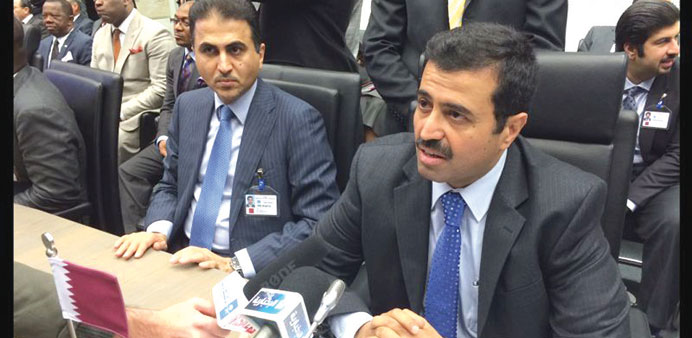Qatar’s Minister of Energy and Industry HE Dr Mohammed bin Saleh al-Sada attends the 164th Opec meeting in Vienna yesterday.
Bloomberg
Vienna
Energy ministers from Opec countries agreed yesterday to keep the group’s target for crude output unchanged at 30mn bpd.
“We have rolled it over,” Saudi Arabia’s Ali al-Naimi told reporters after three hours of closed-door talks finished in Vienna. “We are all satisfied.”
Maintaining the current target for the 12-nation group will ensure stability of oil prices, Venezuela’s Energy Minister Rafael Ramirez said. The cap adequately matches demand and is unlikely to change much in 2014, Suhail Mohammed al-Mazrouei, the oil minister for the UAE, said shortly before the talks began.
Some analysts warn that excess supply, including US shale oil and a potential resurgence in exports from Iran, Libya and Iraq, may push prices lower next year if production cuts aren’t made. Brent crude has settled above $100 a barrel for all but five days this year.
Opec will hold its next meeting June 11, al-Naimi said. The group also agreed to extend secretary general Abdalla El-Badri’s term by one year, he said. The Libyan official has already served an additional 12 months after the group failed to select a successor from among three candidates last December.
Al-Naimi said before the closed-door meeting that 30mn isn’t too much for Opec to target. He also said there’s no need for Saudi Arabia to cut its own production level. The kingdom is Opec’s biggest oil exporter and produced 9.65mn bpd last month, according to a Bloomberg survey.
The Centre for Global Energy Studies in London and Citigroup Inc in New York have forecast that Saudi Arabia as well as Kuwait, Qatar and the UAE would have to reduce production by 1mn to 2mn bpd in 2014 to prevent a glut and keep prices stable.
In the past two years, Saudi Arabia has adjusted its own production without any change to Opec’s formal output ceiling.
“Considerable supply-side risks in Opec” mean the group will probably need to cut output only by 600,000 barrels a day next year, which is within Saudi Arabia’s capability to do alone, according to Harry Tchilinguirian and Gareth Lewis- Davies, analysts at BNP Paribas SA.
“In addition to continuing problems in Nigeria, the planned incremental supply from Iraq may not emerge due to civil unrest, a recovery in Libyan output in the near-term is unlikely, Venezuelan political unrest is a concern and we believe the re-emergence of Iranian barrels remains some way off,” the BNP analysts said in an e-mailed report on Tuesday.
The US is pumping the most in almost a quarter century amid surging production from shale formations. It will surpass Russia and Saudi Arabia to become the world’s largest oil producer for a few years from about 2015, the International Energy Agency said last month.

